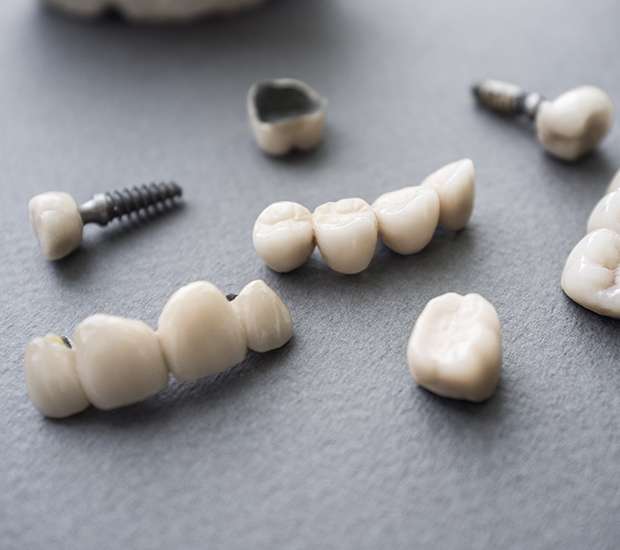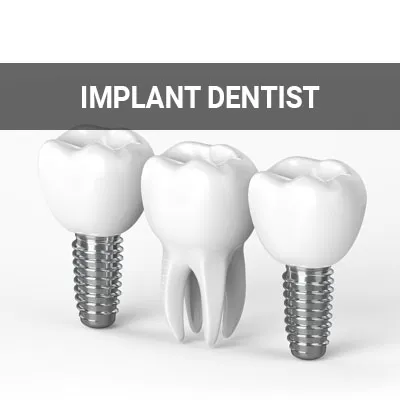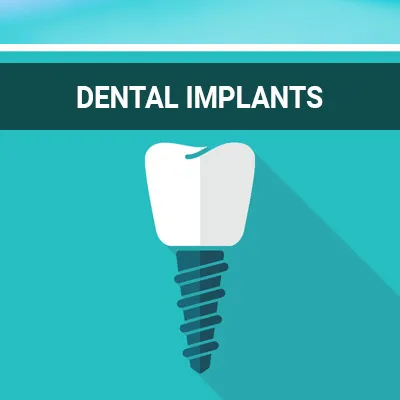The Difference Between Dental Implants and Mini Dental Implants Williamsville, NY
If you have lost one or more teeth, you can have full dental functions by choosing dental implants. With implant restoration, the dentist will offer you regular implants or mini dental implants. Mini dental implants are smaller than conventional implants and do not require as much healthy bone tissue for placement. It is a good alternative for patients who do not want or cannot undergo a bone graft procedure.
Mini dental implants are available at Pure Dental of Williamsville in Williamsville and the surrounding area. They are a reliable option for patients who may be hesitant about the invasive process of regular implants or do not have enough bone mass in their jaws to support them. Call our office at (716) 328-1411 to schedule an appointment with Pure Dental of Williamsville for a consultation.
What Are Mini Dental Implants?
Standard implants and mini dental implants are the two main types of dental implants used for tooth restoration. According to the American Academy of Implant Dentistry (AAID), up to 35 million people in the United States have lost their entire lower or upper teeth, or both. Implants are titanium metal posts inserted into the jawbone, designed to mimic the tooth root and support a crown, bridge, or denture. Implant restorations are safe, stable, effective, and reliable.
However, since implants typically sit inside the jawbone, patients who have experienced jawbone resorption may not qualify for conventional dental implants without a preliminary bone graft procedure. Fortunately, mini dental implants provide a way out. With smaller dimensions, they do not need full bone mass for support and can restore one or more teeth on a dental arch without preparatory procedures.
Size and Shape of the Implants
Regular dental implants typically have a diameter of 3.25mm to 5mm, while mini dental implants can be between 2mm to 3mm wide. Due to their size, mini implants induce less effect on the jawbone and need less jawbone mass for support. They are also called narrow-diameter implants or small diameter implants (NDIs or SDIs).
Regular implants consist of two pieces – the implant post and abutment, which connect the restoration to the implant. On the other hand, the mini implant is a solid single-piece screw consisting of a post and a ball-shaped top that is visible above the gum line. Restorations fabricated for mini implants often have a rubber O ring that connects to the ball.
“Implants are titanium metal posts inserted into the jawbone, designed to mimic the tooth root and support a crown, bridge, or denture.”
Candidates For Mini Dental Implants
Mini dental implants are commonly used to support dentures and prevent bone loss. However, they may be a good option for a dental bridge or dental crown as well. Mini dental implants work in the same way as traditional implants, although the placement process is less invasive and requires less supporting bone. Mini dental implants are a versatile solution capable of treating a wide range of issues, from single tooth replacement to supporting dentures for a full arch replacement. Mini dental implants can be an effective option for patients who do not have enough bone density in the jaw to support traditional implants.
The American Academy of Implant Dentistry explains that a bone graft procedure can strengthen the jawbone for traditional implants. However, not every patient is a candidate for regular dental implants. This is where mini dental implants come in as a recommended alternative. Mini dental implants are often recommended for patients with small teeth, who want restoration in narrow spaces, have lost a lot of bone, need replacement of front teeth, or want a full smile quickly.
“Mini dental implants are commonly used to support dentures and prevent bone loss.”
Benefits of Mini Dental Implants
As mentioned earlier, the most significant benefit of mini dental implants is that it allows patients who have lost a good portion of their jawbone structure to enjoy the benefits of dental implants. Also, those who have endured poorly fitting lower dentures can get four to six mini implants to support the denture. Implant-supported dentures are more comfortable and stable than regular dentures.
Another benefit is that mini dental implants remove the need for major procedures – the placement procedure is relatively easy and non-invasive. Without invasive procedures, the healing time is faster since there are no incisions and suturing. The entire implant restoration procedure takes less time compared to regular dental implants and requires fewer office visits.
Both mini implants and standard implants help to prevent further tooth loss or atrophy. When a tooth is lost, the jawbone loses the stimulation provided by the tooth roots and starts to shrink gradually. Dental implants stimulate the jaw during chewing or biting to keep the bone healthy.
“Both mini implants and standard implants help to prevent further tooth loss or atrophy.”
Check out what others are saying about our dental services on Yelp: The Difference Between Dental Implants and Mini Dental Implants in Williamsville, NY
Drawbacks of Mini Dental Implants
Since mini implants are about half the size of regular implants, two MDIs are sometimes required to provide support comparable to one standard implant. This may induce slightly more stress on the jawbone and may extend healing time due to the different weight distribution.
Mini implants may not be suitable for patients who deal with teeth grinding or clenching. Known as bruxism, this issue typically places undue stress on the teeth and with time, may weaken mini implants. To tackle this, the dentist may recommend wearing a nightguard to protect the implant restoration.
The rubber O-rings on the head of the mini implants will require replacement when they loosen or wear out. The frequency of replacement typically depends on how often the patient removes and replaces their dentures.
“The rubber O-rings on the head of the mini implants will require replacement when they loosen or wear out.”
Questions Answered on This Page
Q. What are mini dental implants?
Q. What are mini dental implants?
Q. What are the benefits of mini dental implants?
Q. What are the drawbacks of mini dental implants?
Q. What is the placement procedure for mini dental implants?
People Also Ask
Q. Who is a good candidate for dental implants?
Q. What is the most durable option for replacing missing teeth?
Q. What can patients do to reduce their anxiety about receiving a dental implant?
Q. What is the difference between dentures and implants?
Q. What dietary and lifestyle changes do I need to make after my dental implant procedure?
The Placement Procedure
The dentist can complete the placement of mini implants in one office visit without making incisions or sutures. On the other hand, regular implants involve two procedures. The first stage is intensive because the doctor must create a gap in the jawbone for implant posts. The second stage is more straightforward and entails revealing the implant posts to connect the abutment.
If the patient requires a sinus lift or bone graft, they will need to wait for some months for the jaw to heal before implant placement. After the implantation procedure, it will take another three to six months before the dentist can connect the final restoration.
With preliminary procedures out of the way, the treatment timeline for mini implants reduces remarkably. Sometimes, the patients may get a temporary dental prosthesis on the same day as the implant placement. Same-day restorations allow patients to get dental functions before the bones have healed fully.
“The dentist can complete the placement of mini implants in one office visit without making incisions or sutures.”
Frequently Asked Questions About Implants and Mini Implants
Q. Are there differences between implants and mini dental implants in terms of durability?
A. Dental implants are created from titanium, a biocompatible metal that fuses with the jawbone. Both options are highly durable, but their lifespan typically depends on the level of care provided. By brushing, flossing, and visiting the dentist regularly, you can keep your oral cavity and implants in excellent condition for a long time.
Q. Will mini dental implants be as strong as my natural teeth?
A. In most cases, mini implants have the same strength – if not more – than natural teeth. Mini implants provide full dental functionality and patients will be able to eat all their favorite meals. However, you need to be careful since implant restorations are just as vulnerable to damages as natural teeth.
Q. Is the placement procedure painful?
A. Many patients often register their surprise when they realize the convenience of the implant procedure. If you suffer from dental anxiety, you should talk to the dentist. They will discuss options to keep you as comfortable as possible throughout the procedure.
Q. How long does recovery take?
A. With mini dental implants, you can return to your routine almost immediately. The procedure is minimally invasive, which allows for fairly fast healing. In the first 24 hours after the procedure, you may need to take only soft foods and follow your dentist's instructions for a full recovery.
Dental Implant Terminology
Call Us Today
If you are interested in restoring your smile, call us at 716-328-1411 for more information about implants and mini dental implants. We are here to help you make the right decision about replacing missing or severely damaged teeth. Our friendly team is willing and able to answer any questions you have about the process.
Helpful Related Links
- American Dental Association (ADA). Glossary of Dental Clinical Terms. 2025
- American Academy of Cosmetic Dentistry® (AACD). Home Page. 2025
- WebMD. WebMD’s Oral Care Guide. 2025
About our business and website security
- Pure Dental of Williamsville was established in 2000.
- We accept the following payment methods: American Express, Cash, Check, Discover, MasterCard, and Visa
- We serve patients from the following counties: Erie County and Niagara County
- We serve patients from the following cities: Buffalo, Williamsville, Clarence, Amherst, East Amherst, Cheektowaga, West Seneca, Depew, Lancaster, Lackawanna, Akron, Eden, Little Valley, Grand Island, Elma, Niagara Falls,Hamburg, Orchard Park and Lockport
- Norton Safe Web. View Details
- Trend Micro Site Safety Center. View Details
Back to top of The Difference Between Dental Implants and Mini Dental Implants
QR code for The Difference Between Dental Implants and Mini Dental Implants











